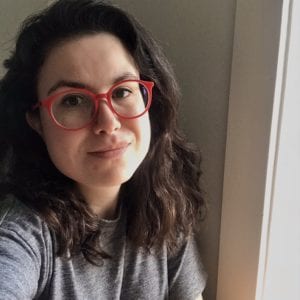Three magnificent new interns have joined the Press this fall—remotely, from around the country—and it’s our pleasure to introduce you to each of them here. We’ll share their 60-second Q&As every #MeettheInternWednesday in the coming weeks, so check back!
P.S. Interested in an internship with us in Spring 2023? Applications are due November 1. Learn more.
Meet Tobi
 CCP: What’s your favorite aspect of the intern experience at Copper Canyon Press so far?
CCP: What’s your favorite aspect of the intern experience at Copper Canyon Press so far?
T: It has been such a gift to see the depths of care and attention to detail that go into all stages of publishing CCP books. I’ve gained insight into not just the how, but also the “why” of how a nonprofit press brings extraordinary poetry to the world, and I feel deeply connected to the love for poetry that guides the press’s decisions. I have been humbled by the openness and support with which my opinions have been invited into this space. Being able to contribute to this work and learn so much about the process of getting books into the hands of readers, from editing through production and marketing, has been invaluable.
CCP: Please tell us about a forthcoming Copper Canyon title you’re excited about, and why.
T: Natalie Eilbert‘s Overland is a collection guided by a strenuous concern for the suffering our political, personal, and physical climates have inflicted on our bodies and our planet. Eilbert is attentive to the poetic and linguistic possibilities of our present without deflating the staggering costs of its disasters. Overland‘s lyric lament illuminates this moment in history through close attention to its effects on our interiors and I feel implicated in Eilbert’s honest interrogations of self.
CCP: Please give us a line from a poem that you can’t get out of your head.
T: Not technically a line because it is a prose poem, but from Rosmarie Waldrop’s “Lament for Barbara Guest”: “It is the connecting between moments–not the moments themselves–that is consciousness.Field broken by low running water, dour sky, the earth in twists moving like the water into the body’s memory of itself.”
Meet Jay
 CCP: What’s your favorite aspect of the intern experience at Copper Canyon Press so far?
CCP: What’s your favorite aspect of the intern experience at Copper Canyon Press so far?
J: Everyday I’m delighted by the passion that Copper Canyon brings to bear. A love for poetry and a belief in its necessity stands at the center of the process, from editorial to marketing and beyond. Being surrounded by that passion humbles and awes me, and the quality of work it gives birth to astonishes me. That sort of fervor is strenuous and effortful, undoubtedly, but learning how to practically cultivate and maintain it has been the best part of the experience so far. It takes so much work to make a book happen, but if you’re doing it right, how can you not feel like you’re on fire?
CCP: Please tell us about a forthcoming Copper Canyon title you’re excited about, and why.
J: Deborah Landau‘s collection Skeletons is a fleshy, existentialist, desirous delight. Never wasting a syllable, Landau makes music of the language that exists between loneliness and ecstatic connection, her acrostic “Skeletons” interwoven with unapologetically erotic “Flesh” poems and negotiating intimacy in the in-between. Landau creates a wholly original sonic logic and language; I can’t wait for others to get lost in it as I have.
CCP: Please give us a line from a poem that you can’t get out of your head.
J: I know it’s a simple line, but I’ve thought about it every day for six months. From “Naxos,” by Sandra Lim:
Meet Azura
 CCP: What’s your favorite aspect of the intern experience at Copper Canyon Press so far?
CCP: What’s your favorite aspect of the intern experience at Copper Canyon Press so far?
A: This is a holistic internship—I’ve been able to try everything from editorial design, to discussing manuscript submission, to finding marketing materials. A book is touched by so many hands, each holding it to a different, illuminating angle, before it reaches the reader. I have a newfound understanding and appreciation for the many moving parts that make some of my favorite collections happen.
CCP: Please tell us about a forthcoming Copper Canyon title you’re excited about, and why.
A: Paisley Rekdal‘s West: A Translation. I have so much respect for documentarian poetics. Paisley Rekdal’s West: A Translation places us in the construction of the transcontinential railroad, the Chinese Exclusion Act alongside negotiations of the slavery and colonization during westward expansion. We begin understanding history through reconfigured letters, speeches, immigration questionnaires, through the very bodies and personalities of the people as Rekdal excavates from history. The train, a machine of both progress and regression, comes alive on page and the people who made it, more than collateral. West: A Translation is captivating, immersive, and heart-rendingly necessary.
“I want to put that dancer back / into the privacy of history But he’s got his own future. / He’s out there, now, working on the railroad.” —”Antiquity”
CCP: Please give us a line from a poem that you can’t get out of your head.
A: “I am a woman searching for my savagery even if it’s doomed,” wrote June Jordan in her poem, “Poem for Nana.” Jordan is one of my poetic foremothers, someone who gave me permission to reach for unapologetic boldness and integrity as a writer who dared to be black, woman, queer and radical all at once. Her imagination is revolutionary to me.